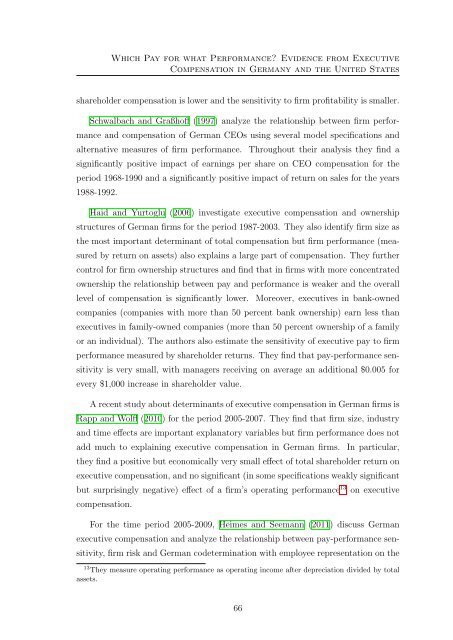Three Essays on Executive Compensation - KOPS - Universität ...
Three Essays on Executive Compensation - KOPS - Universität ...
Three Essays on Executive Compensation - KOPS - Universität ...
Create successful ePaper yourself
Turn your PDF publications into a flip-book with our unique Google optimized e-Paper software.
Which Pay for what Performance? Evidence from <strong>Executive</strong><br />
Compensati<strong>on</strong> in Germany and the United States<br />
shareholder compensati<strong>on</strong> is lower and the sensitivity to firm profitability is smaller.<br />
Schwalbach and Graßhoff (1997) analyze the relati<strong>on</strong>ship between firm performance<br />
and compensati<strong>on</strong> of German CEOs using several model specificati<strong>on</strong>s and<br />
alternative measures of firm performance. Throughout their analysis they find a<br />
significantly positive impact of earnings per share <strong>on</strong> CEO compensati<strong>on</strong> for the<br />
period 1968-1990 and a significantly positive impact of return <strong>on</strong> sales for the years<br />
1988-1992.<br />
Haid and Yurtoglu (2006) investigate executive compensati<strong>on</strong> and ownership<br />
structures of German firms for the period 1987-2003. They also identify firm size as<br />
the most important determinant of total compensati<strong>on</strong> but firm performance (measured<br />
by return <strong>on</strong> assets) also explains a large part of compensati<strong>on</strong>. They further<br />
c<strong>on</strong>trol for firm ownership structures and find that in firms with more c<strong>on</strong>centrated<br />
ownership the relati<strong>on</strong>ship between pay and performance is weaker and the overall<br />
level of compensati<strong>on</strong> is significantly lower. Moreover, executives in bank-owned<br />
companies (companies with more than 50 percent bank ownership) earn less than<br />
executives in family-owned companies (more than 50 percent ownership of a family<br />
or an individual). The authors also estimate the sensitivity of executive pay to firm<br />
performance measured by shareholder returns. They find that pay-performance sensitivity<br />
is very small, with managers receiving <strong>on</strong> average an additi<strong>on</strong>al $0.005 for<br />
every $1,000 increase in shareholder value.<br />
A recent study about determinants of executive compensati<strong>on</strong> in German firms is<br />
Rapp and Wolff (2010) for the period 2005-2007. They find that firm size, industry<br />
and time effects are important explanatory variables but firm performance does not<br />
add much to explaining executive compensati<strong>on</strong> in German firms. In particular,<br />
they find a positive but ec<strong>on</strong>omically very small effect of total shareholder return <strong>on</strong><br />
executive compensati<strong>on</strong>, and no significant (in some specificati<strong>on</strong>s weakly significant<br />
but surprisingly negative) effect of a firm’s operating performance 13 <strong>on</strong> executive<br />
compensati<strong>on</strong>.<br />
For the time period 2005-2009, Heimes and Seemann (2011) discuss German<br />
executive compensati<strong>on</strong> and analyze the relati<strong>on</strong>ship between pay-performance sensitivity,<br />
firm risk and German codeterminati<strong>on</strong> with employee representati<strong>on</strong> <strong>on</strong> the<br />
13 They measure operating performance as operating income after depreciati<strong>on</strong> divided by total<br />
assets.<br />
66
















